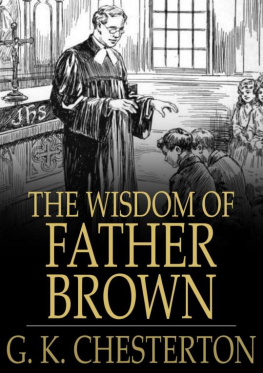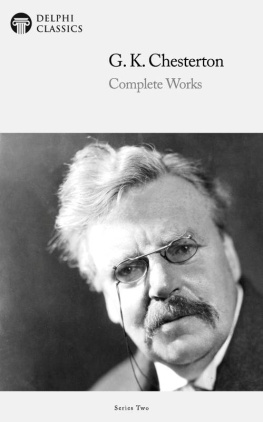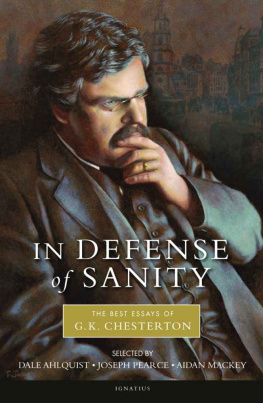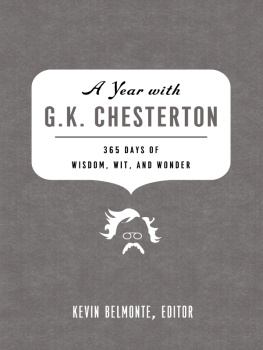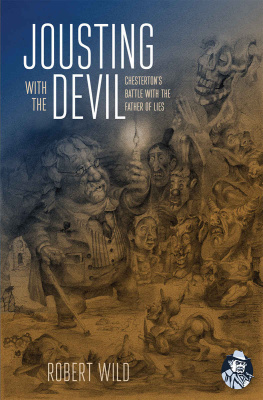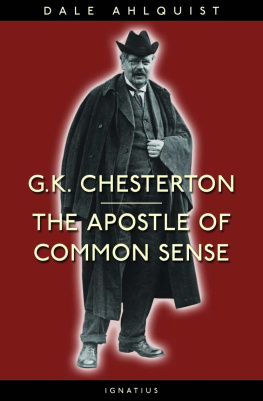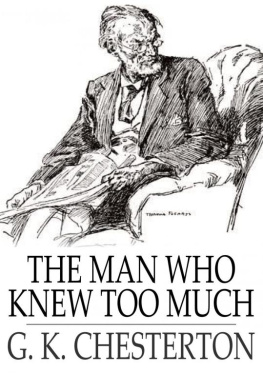G. K. Chesterton - The Defendant
Here you can read online G. K. Chesterton - The Defendant full text of the book (entire story) in english for free. Download pdf and epub, get meaning, cover and reviews about this ebook. year: 2015, publisher: Open Road Integrated Media, genre: Science. Description of the work, (preface) as well as reviews are available. Best literature library LitArk.com created for fans of good reading and offers a wide selection of genres:
Romance novel
Science fiction
Adventure
Detective
Science
History
Home and family
Prose
Art
Politics
Computer
Non-fiction
Religion
Business
Children
Humor
Choose a favorite category and find really read worthwhile books. Enjoy immersion in the world of imagination, feel the emotions of the characters or learn something new for yourself, make an fascinating discovery.

- Book:The Defendant
- Author:
- Publisher:Open Road Integrated Media
- Genre:
- Year:2015
- Rating:3 / 5
- Favourites:Add to favourites
- Your mark:
- 60
- 1
- 2
- 3
- 4
- 5
The Defendant: summary, description and annotation
We offer to read an annotation, description, summary or preface (depends on what the author of the book "The Defendant" wrote himself). If you haven't found the necessary information about the book — write in the comments, we will try to find it.
The Defendant — read online for free the complete book (whole text) full work
Below is the text of the book, divided by pages. System saving the place of the last page read, allows you to conveniently read the book "The Defendant" online for free, without having to search again every time where you left off. Put a bookmark, and you can go to the page where you finished reading at any time.
Font size:
Interval:
Bookmark:
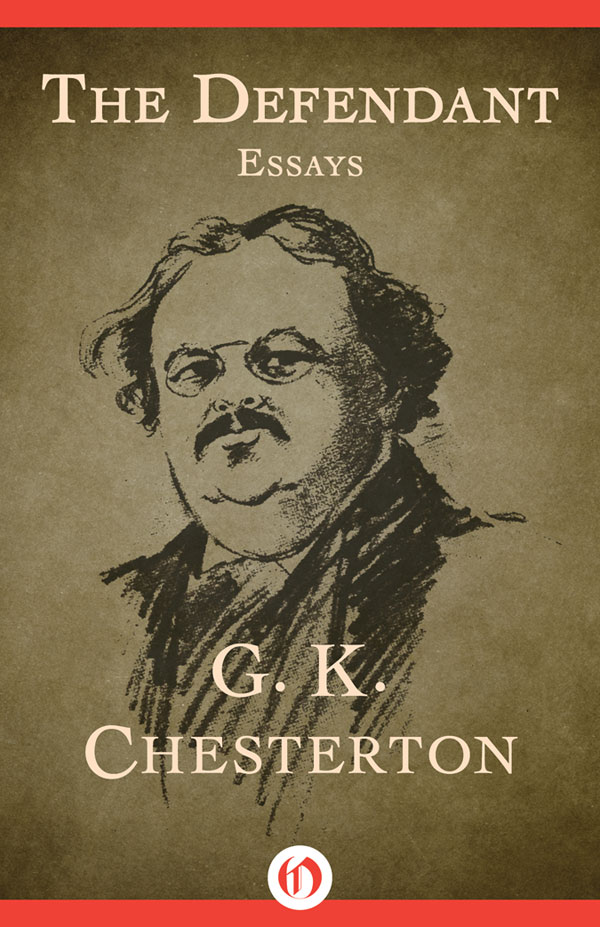
The Defendant
Essays
G. K. Chesterton

IN DEFENCE OF A NEW EDITION
The reissue of a series of essays so ephemeral and even superfluous may seem at the first glance to require some excuse; probably the best excuse is that they will have been completely forgotten, and therefore may be read again with entirely new sensations. I am not sure, however, that this claim is so modest as it sounds, for I fancy that Shakespeare and Balzac, if moved to prayers, might not ask to be remembered, but to be forgotten, and forgotten thus; for if they were forgotten they would be everlastingly re-discovered and re-read. It is a monotonous memory which keeps us in the main from seeing things as splendid as they are. The ancients were not wrong when they made Lethe the boundary of a better land; perhaps the only flaw in their system is that a man who had bathed in the river of forgetfulness would be as likely as not to climb back upon the bank of the earth and fancy himself in Elysium.
If, therefore, I am certain that most sensible people have forgotten the existence of this bookI do not speak in modesty or in prideI wish only to state a simple and somewhat beautiful fact. In one respect the passing of the period during which a book can be considered current has afflicted me with some melancholy, for I had intended to write anonymously in some daily paper a thorough and crushing exposure of the work inspired mostly by a certain artistic impatience of the too indulgent tone of the critiques and the manner in which a vast number of my most monstrous fallacies have passed unchallenged. I will not repeat that powerful article here, for it cannot be necessary to do anything more than warn the reader against the perfectly indefensible line of argument adopted at the end of p. 28. I am also conscious that the title of the book is, strictly speaking, inaccurate. It is a legal metaphor, and, speaking legally, a defendant is not an enthusiast for the character of King John or the domestic virtues of the prairie-dog. He is one who defends himself, a thing which the present writer, however poisoned his mind may be with paradox, certainly never dreamed of attempting.
Criticism upon the book considered as literature, if it can be so considered, I should, of course, never dream of discussingfirstly, because it is ridiculous to do so; and, secondly, because there was, in my opinion, much justice in such criticism.
But there is one matter on which an author is generally considered as having a right to explain himself, since it has nothing to do with capacity or intelligence, and that is the question of his morals.
I am proud to say that a furious, uncompromising, and very effective attack was made upon what was alleged to be the utter immorality of this book by my excellent friend Mr. C.F.G. Masterman, in the Speaker. The tendency of that criticism was to the effect that I was discouraging improvement and disguising scandals by my offensive optimism. Quoting the passage in which I said that diamonds were to be found in the dustbin, he said: There is no difficulty in finding good in what humanity rejects. The difficulty is to find it in what humanity accepts. The diamond is easy enough to find in the dustbin. The difficulty is to find it in the drawing room. I must admit, for my part, without the slightest shame, that I have found a great many very excellent things in drawing rooms. For example, I found Mr. Masterman in a drawing room. But I merely mention this purely ethical attack in order to state, in as few sentences as possible, my difference from the theory of optimism and progress therein enunciated. At first sight it would seem that the pessimist encourages improvement. But in reality it is a singular truth that the era in which pessimism has been cried from the housetops is also that in which almost all reform has stagnated and fallen into decay. The reason of this is not difficult to discover. No man ever did, and no man ever can, create or desire to make a bad thing good or an ugly thing beautiful. There must be some germ of good to be loved, some fragment of beauty to be admired. The mother washes and decks out the dirty or careless child, but no one can ask her to wash and deck out a goblin with a heart like hell. No one can kill the fatted calf for Mephistopheles. The cause which is blocking all progress today is the subtle scepticism which whispers in a million ears that things are not good enough to be worth improving. If the world is good we are revolutionaries, if the world is evil we must be conservatives. These essays, futile as they are considered as serious literature, are yet ethically sincere, since they seek to remind men that things must be loved first and improved afterwards.
G. K. C.
INTRODUCTION
In certain endless uplands, uplands like great flats gone dizzy, slopes that seem to contradict the idea that there is even such a thing as a level, and make us all realize that we live on a planet with a sloping roof, you will come from time to time upon whole valleys filled with loose rocks and boulders, so big as to be like mountains broken loose. The whole might be an experimental creation shattered and cast away. It is often difficult to believe that such cosmic refuse can have come together except by human means. The mildest and most cockney imagination conceives the place to be the scene of some war of giants. To me it is always associated with one idea, recurrent and at last instinctive. The scene was the scene of the stoning of some prehistoric prophet, a prophet as much more gigantic than after-prophets as the boulders are more gigantic than the pebbles. He spoke some wordswords that seemed shameful and tremendousand the world, in terror, buried him under a wilderness of stones. The place is the monument of an ancient fear.
If we followed the same mood of fancy, it would be more difficult to imagine what awful hint or wild picture of the universe called forth that primal persecution, what secret of sensational thought lies buried under the brutal stones. For in our time the blasphemies are threadbare. Pessimism is now patently, as it always was essentially, more commonplace than piety. Profanity is now more than an affectationit is a convention. The curse against God is Exercise I. in the primer of minor poetry. It was not, assuredly, for such babyish solemnities that our imaginary prophet was stoned in the morning of the world. If we weigh the matter in the faultless scales of imagination, if we see what is the real trend of humanity, we shall feel it most probable that he was stoned for saying that the grass was green and that the birds sang in spring; for the mission of all the prophets from the beginning has not been so much the pointing out of heavens or hells as primarily the pointing out of the earth.
Religion has had to provide that longest and strangest telescopethe telescope through which we could see the star upon which we dwelt. For the mind and eyes of the average man this world is as lost as Eden and as sunken as Atlantis. There runs a strange law through the length of human historythat men are continually tending to undervalue their environment, to undervalue their happiness, to undervalue themselves. The great sin of mankind, the sin typified by the fall of Adam, is the tendency, not towards pride, but towards this weird and horrible humility.
This is the great fall, the fall by which the fish forgets the sea, the ox forgets the meadow, the clerk forgets the city, every man forgets his environment and, in the fullest and most literal sense, forgets himself. This is the real fall of Adam, and it is a spiritual fall. It is a strange thing that many truly spiritual men, such as General Gordon, have actually spent some hours in speculating upon the precise location of the Garden of Eden. Most probably we are in Eden still. It is only our eyes that have changed.
Font size:
Interval:
Bookmark:
Similar books «The Defendant»
Look at similar books to The Defendant. We have selected literature similar in name and meaning in the hope of providing readers with more options to find new, interesting, not yet read works.
Discussion, reviews of the book The Defendant and just readers' own opinions. Leave your comments, write what you think about the work, its meaning or the main characters. Specify what exactly you liked and what you didn't like, and why you think so.

